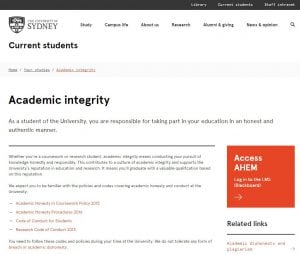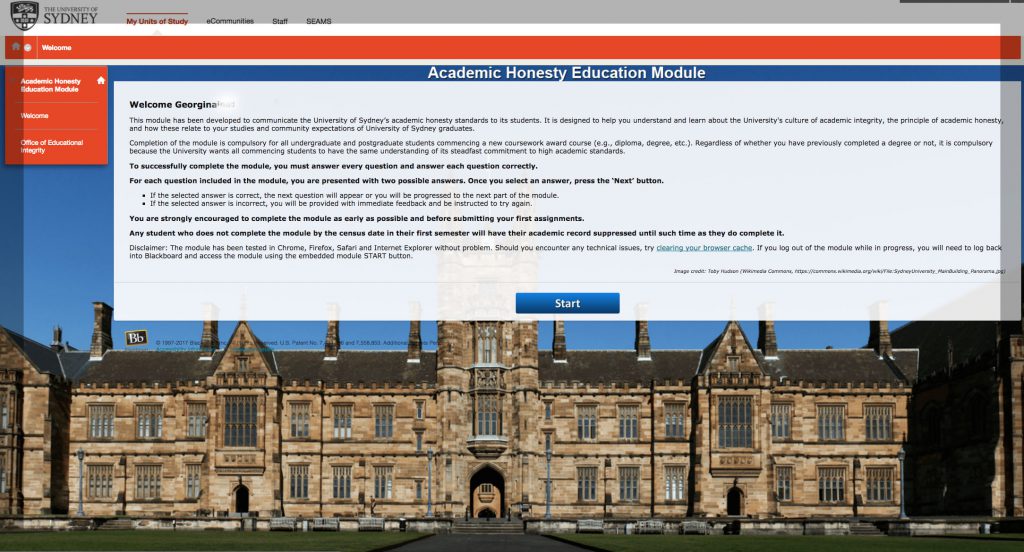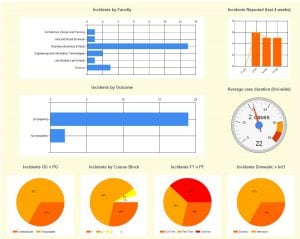In this article we highlight some of the work the Office of Educational Integrity is doing to support you and your students this semester.
Better information for students
 We have worked closely with the Student Information and Marketing and Communications teams to improve the information on academic integrity provided to students. This new information is hosted on the academic integrity pages of the Current Students website and is set to replace similar content on separate faculty websites. We hope you’ll point your students in the direction of the new website and we welcome any feedback or suggestions you might have.
We have worked closely with the Student Information and Marketing and Communications teams to improve the information on academic integrity provided to students. This new information is hosted on the academic integrity pages of the Current Students website and is set to replace similar content on separate faculty websites. We hope you’ll point your students in the direction of the new website and we welcome any feedback or suggestions you might have.
An all new Academic Honesty Education Module
The second version of the Academic Honesty Education Module (AHEM V2) was recently launched and has already been completed by over 3,000 students. AHEM V2 has been built in the adaptive learning design platform Smart Sparrow, which means we’ve been able to create a more user friendly version than the first iteration of AHEM. We have also been able to expand the range of issues covered to improve AHEM’s relevance to all students of the University.
We have also been working with Blackboard to improve the usefulness of the Academic Honesty Tool. From the first week of Semester 1, you’ll now be able to sync AHEM completions with your own unit of study Grade Centres.

AHEM V2 will be a great complement to the education you provide to your students about academic honesty in different disciplinary contexts, so we encourage all teaching staff to sign up to the AHEM eCommunity to see the new module for themselves. For information on how to do so, see the Educating Students page on the educational integrity intranet site.
The new syncing feature will also make it easier for you to incorporate AHEM as a distinct activity into your units, be that as a class preparation activity, pre-submission task, or non-graded assessment item. We’ll be talking to first year coordinators through this in Week 1 as part of the First Year Coordinators Program, and will provide further information on the intranet site once the enhanced tool becomes available.
Simplified case management and enhanced trend reporting

In our last story on mitigating risks to academic integrity, we reported that there were over 3,300 instances of suspected academic dishonesty or plagiarism reported to faculty Educational Integrity Coordinators in 2016. This increased level of reporting put faculty educational integrity teams under serious strain – especially with the two assessment peaks in each of Semesters 1 and 2 – resulting in some delays in the resolution of reported cases.
In light of this, we have been working closely with the Records Management Team to develop a new online reporting dashboard in order to help faculty teams manage fluctuations in their caseloads. The new dashboard not only simplifies case management but also enables us to identify trends in the nature of the incidents reported in real-time. This will mean we can identify and respond to issues as they emerge, more rapidly than has been possible in the past. We will be showcasing the new dashboard and other enhancements to faculty educational integrity teams in the coming weeks and are looking at ways to make the dashboard visible to all members of the University community in the not too distant future.
Much more to come
These are just a few of the things we’ve been working on to improve the resources available to you, your students, and faculty educational integrity teams. There’s plenty more to come, including an expanded range of development activities for students and improved training and professional development resources for staff.
In the meantime, please don’t hesitate to get in touch with any questions or concerns you might have. You can find our contact details here and here.
We wish you all the best for what is shaping up to be another busy year!





